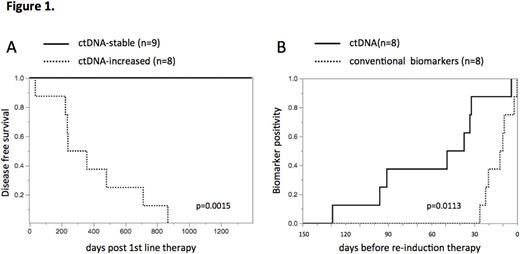Abstract
Background: With the recent advent of molecular techniques such as droplet digital PCR (ddPCR), tumor specific genomic component in the plasma or serum, known as circulating tumor DNA (ctDNA), represents one of the most sensitive and noninvasive biomarkers in solid tumors. In the field of hematological malignancies, it remains to be elucidated whether ctDNA monitoring enables accurate prediction of clinical relapse in individual patients. To address this issue, we retrospectively investigated 17 patients with hematological malignancies who had achieved complete or partial remission after first-line induction therapy.
Methods: Our cohort consisted of 8 patients with acute myeloid leukemia, 3 with multiple myeloma (MM), 2 with B cell non-Hodgkin's lymphoma, 2 with myelodysplastic syndromes, 1 with B cell acute lymphoblastic leukemia, and 1 with T cell non-Hodgkin's lymphoma. Serial biopsy and matched serum samples were collected at the time of diagnosis (termed "baseline") and then throughout the treatment course. Cell-free DNA (cfDNA) was extracted from serum samples. We subjected DNA extracted from baseline tumor DNA and buccal swab to next generation sequencing (NGS), identifying one or two somatic driver mutations. We designed personalized ddPCR assays for each somatic mutation identified (n=16). Statistical analysis was performed using the Kaplan-Meier method and the log-rank test. The first day of 1st line induction therapy was set to day 0 for estimation of the disease-free survival (DFS). For subset analysis of patients who relapsed during follow-up, the day of re-induction therapy initiation for relapse is re-set to day 0. Thereafter, the cumulative incidence of relapse, as assessed by ctDNA or by clinical parameters, was estimated and compared.
Results: The amount of cfDNA at diagnosis was significantly higher compared with paired cfDNA at remission (p=0.037). NGS screening identified somatic driver mutations in all cases, with 2 mutations found in 2 individuals. Overall, we could construct ddPCR assay for all patients; these mutations included NRAS, KRAS, TP53, GATA2, STAG2, JAK3, MYD88, B2M, NPM1, DNMT3A, U2AF1, and SF3B1 . NGS and ddPCR assays had a good concordance in assessing the same tumor rich samples with regard to the variant allele frequency (VAF) (r2=0.96; p< 0.01). CtDNA could be detected in matched cfDNA from baseline serum. Moreover, the dynamic longitudinal changes of ctDNA VAF reflected the observed overall clinical response, as determined by clinical biomarker or imaging. 8 patients clinically relapsed at a median of 297 days post 1st line therapy (termed "relapsed group"), with the remaining 9 patients disease free at a median of 332 days post 1st line therapy (termed "remission group"). Notably, all of the patients in relapsed group became ctDNA detectable or had ctDNA increased at two consecutive points (termed "ctDNA-increase"). In marked contrast, all of the patients in remission group remained ctDNA undetectable or stable (termed "ctDNA-stable"). Patients with ctDNA-increased had a significantly inferior DFS: 2-year DFS 12.5% in patients with ctDNA-increased vs. 100% in ctDNA-stable, p=0.0115 (Figure 1A). Finally, we compared the timing of molecular relapse and clinical relapse, as assessed by ctDNA and by conventional biomarkers (flowcytometry in leukemia or serum free light chain in MM), respectively, in relapsed group. As a result, molecular relapse as assessed by ctDNA had a median of 30 days lead time (range, 4 to 119 days) over clinical relapse as assessed by conventional clinical parameters (Figure 1B).
Conclusions: In summary, personalized ctDNA monitoring could identify patients with impending relapse in advance of established clinical parameters in hematological malignancies. This might allow for clinicians to initiating earlier therapeutic interventions for impending relapse. Further prospective studies in a much larger cohort of hematological malignancies are needed to confirm these findings.
Nagamura-Inoue: Tsubakimoto Chain CO.: Research Funding; Rohto Pharmaceutical Co., Ltd.: Research Funding; AMED grant: Research Funding. Tojo: AMED grant: Research Funding.
Author notes
Asterisk with author names denotes non-ASH members.


This feature is available to Subscribers Only
Sign In or Create an Account Close Modal